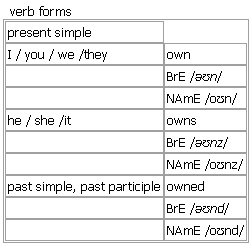|
Từ điển Oxford Advanced Learner 8th
 own
own

own [own owns owned owning] adjective, pronoun, verb BrE [əʊn] NAmE [oʊn]
adjective, pronoun
1. used to emphasize that sth belongs to or is connected with sb
• It was her own idea.
• I saw it with my own eyes (= I didn't hear about it from somebody else).
•Is the car your own?
•Your day off is your own (= you can spend it as you wish).
•Our children are grown up and have children of their own.
•For reasons of his own (= particular reasons that perhaps only he knew about), he refused to join the club.
•The accident happened through no fault of her own.
•He wants to come into the business on his own terms.
•I need a room of my own.
•I have my very own room at last. Own cannot be used after an article
•I need my own room.
•I need an own room.
•It's good to have your own room.
•It's good to have the own room.
2. done or produced by and for yourself
• She makes all her own clothes.
• He has to cook his own meals.
more at the devil looks after his own at ↑devil, have a mind of your own at ↑mind n., for sth's own sake at ↑sake 1, like, etc. the sound of your own voice at ↑sound n.
Word Origin:
Old English āgen (adjective and pronoun) ‘owned, possessed’, past participle of āgan ‘owe’; the verb (Old English āgnian ‘possess’, also ‘make own's own’) was originally from the adjective, later probably reintroduced from ↑owner.
Thesaurus:
own adj.
•I have my own room at last.
personal • • individual • • private • |sometimes disapproving subjective •
sb's own/personal/individual/private/subjective experience
sb's own/personal/private/subjective opinion
sb's own/personal/individual needs/requirements/objectives/freedom
Example Bank:
•He wants to come into the business on his own terms.
•I need a room of my own.
•I saw it with my own eyes.
•It's good to have your own room.
•Our children are grown up and have children of their own.
•The accident happened through no fault of her own.
•Your day off is your own.
Idioms: ↑act as if you own the place ▪ ↑come into its own ▪ ↑get your own back ▪ ↑hold your own ▪ ↑on your own ▪ ↑think you own the place
Derived: ↑own up
verb (not used in the progressive tenses)
1. transitive ~ sth to have sth that belongs to you, especially because you have bought it
• Do you own your house or do you rent it?
• I don't own anything of any value.
•Most of the apartments are privately owned.
•an American-owned company
•Does anyone own this coat? It was left in a classroom.
•Don't tell me what to do— you don't own me!
2. intransitive, transitive (old-fashioned)to admit that sth is true
•~ to sth/to doing sth He owned to a feeling of guilt.
•~ (that)… She owned (that) she had been present.
Verb forms: 
Word Origin:
Old English āgen (adjective and pronoun) ‘owned, possessed’, past participle of āgan ‘owe’; the verb (Old English āgnian ‘possess’, also ‘make own's own’) was originally from the adjective, later probably reintroduced from ↑owner.
Thesaurus:
own verb T (not used in the progressive tenses)
•I don't own anything of value.
have • |especially BrE, especially spoken have got • |formal hold • • possess •
own/have/have got/possess a car/house
own/have/have got a company
have/have got/hold a driving licence/passport
own/hold sth legally/jointly
Example Bank:
•He committed the crime with a gun that he legally owned.
•Only when the means of production were communally owned would classes disappear.
•She owns the house jointly with her husband.
•The car was once owned by Elvis Presley.
•The company is a wholly owned subsidiary of SNL Research.
•The museum is privately owned.
•They dreamed of owning their own home.
•Don't tell me what to do— you don't own me!
•I don't own anything of any value.
|
|
|
▼ Từ liên quan / Related words
Related search result for "own"
|
|
